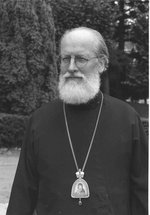Diocese of Sourozh
The Diocese of Sourozh is a diocese of the Moscow Patriarchate in the United Kingdom. It was founded in 1962 by Metropolitan Anthony (Bloom) of Sourozh and takes its name from an ancient diocese in the Crimea which no longer has a bishop. Its patron saint is Stephen of Sourozh. Its temporary ruling bishop is Archbishop Innokenty (Vasilyev) of Korsun (head of Russia's diocese in Western Europe), following the forced retirement of Bishop Basil (Osborne) of Sergievo. The assistant hierarch is Archbishop Anatoly of Kerch.
Before Basil was forced into retirement, the diocese had about thirty parishes in the United Kingdom. Also before Basil's retirement, the diocese published a journal, founded by Metr. Anthony in 1980, entitled Sourozh. The activities of the journal are currently suspended.
Recent history
In the initial decades of the existence of the diocese, the diocese was centred in London and Oxford, consisting mainly of upper middle-class ex-Anglican converts and families of the first emigration from Russia. During these years the political situation between the United Kingdom and the Soviet Union meant that the Moscow Patriarchate could exercise virtually no control over Sourozh diocese. Metr. Anthony encouraged the development of a distinctive style, liturgical practice and ethos within the diocese which reflected the fusion of Franco-Russian emigres and Oxford-London ex-Anglicans in the diocese. This included native-language liturgy, frequent communion, discression over confession before each communion, a relaxed attitude to tradition Russian church dress (e.g. for women: skirts and headscarves), permission of marriage on Saturdays and an avoidance of celebrating the full hierarchical liturgy according to the standard typikon of the Russian Orthodox Church.From the last years of the Soviet Union, large numbers of Russian Orthodox economic migrants arrived in the United Kingdom from Russian lands. Many were surprised by and uncomfortable with and unhappy at the idiosyncracies of ethos, style and liturgical practice which were standard in the diocese. A vocal minority of these Orthodox from Russia began to complain vociferously to the Diocese and, later, to the Moscow Patriarchate itself. In their own eyes, they sought the conformity of the ethos and liturgical practice of the diocese with the standard typikon of the Russian Orthodox Church; in the eyes of the Oxford-London ex-Anglicans, this amounted to the Russification of the diocese.
Shortly before his death, in a manner which is not standard in the Russian Orthodox Church (where bishops are standardly appointed by the Holy Synod), Metr. Anthony nominated as his successor Bishop Basil (Osborne) of Sergievo). After Metr. Anthony's death in 2003, the Holy Synod made Basil administrator of the diocese, but did not name him ruling bishop.
Tensions between the establishment in Sourozh and the new voices came to a head in April 2006, when Bp. Basil requested from the Moscow Patriarchate that he and any in his diocese who wished to follow him be allowed canonical release to enter into the Ecumenical Patriarchate, specifically the Russian Orthodox Exarchate in Western Europe, a diocese of parishes of Russian tradition whose bishop answers to the Ecumenical Patriarch. The character of the Exarchate is similar to the course charted by Anthony in that its parishes are mainly using local languages and appealing to the cultures of Western Europe.
Before making the request, Basil provided for the canonical release of any of his clergy who wished to go elsewhere, and about half have petitioned the Greek Orthodox Archdiocese of Thyateira and Great Britain and received favorable response.[1] Basil's rationale for the request was that the patriarchate could continue to provide pastoral care for those who wished to duplicate Russian church life on British soil, while he could care for those who wished to continue life as it had been under Anthony.
Initially, the Patriarch of Moscow, Alexei II, asked to discuss the matter with Basil, but demanded that he retract his letter to Constantinople, in which he had broached the subject with Ecumenical Patriarch Bartholomew I. Basil refused to retract the letter.
In response to the request of Bp. Basil, Archbishop Innokenty (Vasilyev) of Korsun was dispatched by Moscow and read out a patriarchal decree at the Sourozh cathedral in London retiring Basil and placing control of the diocese under Innokenty. Basil's response was to appeal to the arbitration of the Ecumenical Patriarch, citing canons 9 and 17 of the Fourth Ecumenical Council, which grant to clergy the right of appeal to Constantinople if they have a dispute with their superior hierarch.[2]
On June 8, 2006, the holy synod of the Ecumenical Patriarchate announced that it had considered Basil's appeal and unanimously decided to receive him into its Russian Orthodox Exarchate in Western Europe as an auxiliary bishop. It then elected him to this position with the title of Bishop of Amphipolis, serving as an auxiliary of Abp. Gabriel (de Vylder) of Komana[3] and having authority over a vicariate of the parishes which have chosen to follow him into the Ecumenical Patriarchate.[4]
External links
- Official diocesan website, under Abp. Innokenty
- Sourozh.info, including news, information and statements from Abp. Innokenty
- Dioceseinfo.org, including news, information and statements by those loyal to Bp. Basil (Osborne)
- Cathedral website
- On the canonical situation of Russian Orthodoxy in Britain, by M.C. Steenberg
Categories > Church History
Categories > Church History > Canon Law > Ecclesiology > Jurisdictions > Dioceses
Categories > Church History > Canon Law > Ecclesiology > Jurisdictions > Dioceses > Moscow Patriarchate Dioceses
Categories > OrthodoxWiki > Articles in a series
Categories > Places > Orthodoxy by country
Categories > Places > Orthodoxy in the United Kingdom

